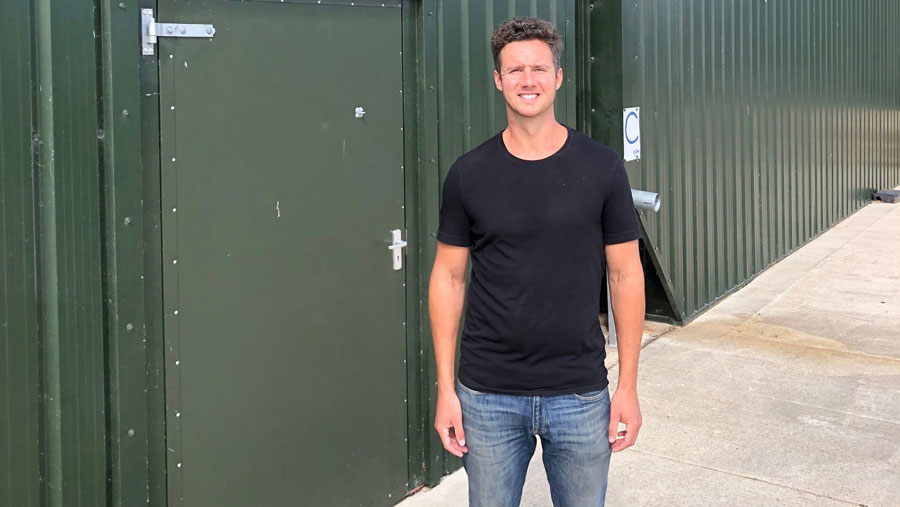How a farmer reversed losses by improving chick start
 Henry Dent @ Trevor Dent
Henry Dent @ Trevor Dent A switch to strategic veterinary care has helped a poultry producer recover from two disastrous crops and save thousands of pounds a year.
Broiler producer Henry Dent farms 270,000 birds at Manor House Farm, near Darlington, Durham, in partnership with his parents Susan and Trevor.
Mr Dent called in a local vet team after two failed crops cost the business £20,000-£30,000 each. “We had two crops on the bounce where the birds just dropped off a cliff – the financials were scary,” he says.
Farm facts
- 270,000 broilers
- 7 sheds
- Producing for the retail sector
- Arable enterprise – 130ha
- Birds are grown to 38-42 days old with a goal weight of 2.6kg
See also: Young chick nutrition: Tips to get critical first days right
He put the first crop failure down to feeding grower pellets for too long. “We had another go without asking for help but had another disastrous result.”
Rather than risk it a third time, the Dents called in vets and a consultant to identify the root cause of the problem.
Senior broiler vet Richard Jackson visited the farm with local vet Charlotte Norman and independent broiler consultant Chris Durrant.
“The flock had been underperforming – both in terms of technical performance and financial returns – for quite a while, so we put a team in around the farmer and implemented weekly visits,” explains Mr Jackson of St Davids Vet Group.
The team began by examining the historical performance data and crop cards, and combined this with weekly vet visits, which included regular post-mortems.
The birds weren’t growing as well as expected, and both gizzard and leg health were suboptimal. The vaccination programme, was also scrutinised.
There was no single solution to the problems, but the investigation revealed that the difficulties could be traced back to the first few days of life.
“We thought we were doing a good job with chick start but we were a mile out,” says Mr Dent. Each cycle was being won or lost in the first 12 hours of the birds entering the house.
Improvements made
The team stepped up support with regular communication. During Covid-19 restrictions this was achieved by setting up a WhatsApp group, with a weekly call to discuss issues and analyse bird weights.
Attention was paid to getting cleaning and disinfection right with a thorough routine. All organic matter was removed, walls were cleaned down, allowed to dry, and disinfected.
With the buildings and fittings cleaned, the house was heated ahead of the chicks coming in. This was done in time to ensure the temperature was steady and the floor was heated through to avoid chilling the young chicks.
Water pressures and drinker heights were all adjusted to match the chick height and ensure adequate access and intakes.
Feeder heights were also tweaked so that chicks could reach food and maximise growth rates from the start. Lights were also brought up to ensure chicks could find the feed and water.
Temperature and humidity levels were carefully monitored for any sign of change and ventilation rates tailored to achieve the best balance.
Mr Dent says another simple measure was a better spread of the birds at tipping. “Tipping the chicks all the way down the shed on either side of the aisle rather than tipping them in two-thirds of the shed, paid dividends.”
The team also monitored gizzard health and found a background viral challenge was damaging the birds.
This was controlled by a switch in the Gumboro vaccine being used.
Results achieved
The combination of measures saw performance improve dramatically over the next three crops.
Although vet costs increased by 40% over the three cycles, margins increased by 44%, leading to an improvement in profitability.
Mr Dent says the extra spending on the vet bills has paid dividends.
“I don’t think you can be tight and solve a problem like ours. We were down £20,000-£30,000 per crop on those two bad crops.”
“We have had three really good crops so far and it’s getting better – there is still performance to be gained.”
Having the support of the vet team was invaluable because they remained positive about finding a solution throughout.
“The focus on the attention to detail during the process and the positive outcome has given us our confidence back,” Mr Dent says.
